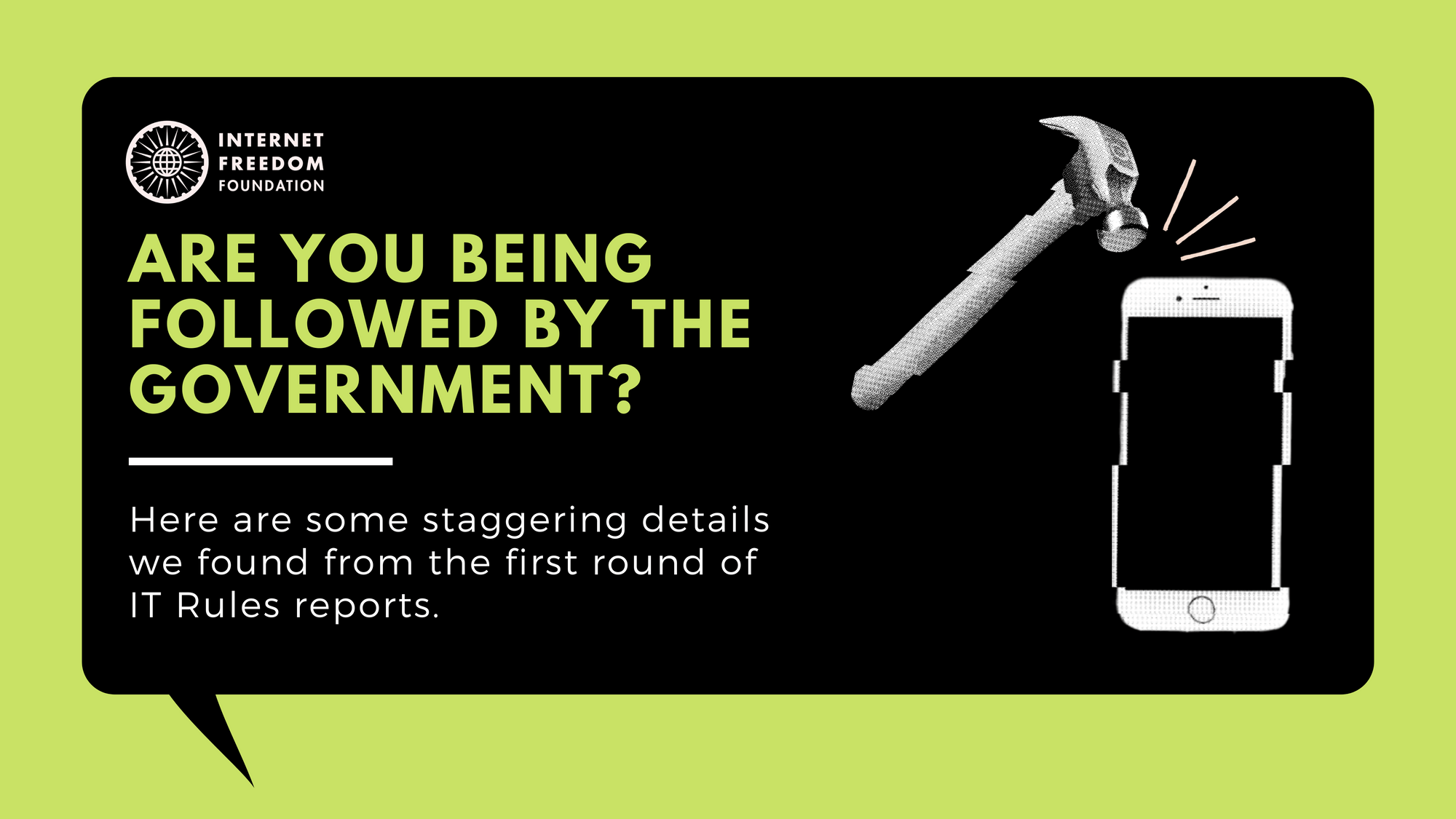
tl;dr
Google, Facebook, Instagram, WhatsApp and Twitter have released their transparency reports in compliance with Rule 4(1)(d) of the Information Technology (Guidelines for Intermediaries and Digital Media Ethics Code) Rules, 2021 (the 2021 IT Rules). The reports highlight some interesting facts and figures, e.g. WhatsApp banned over 2 million Indian user accounts in one month; and 98.4% of Google’s nearly 60,000 removal actions related to copyright claims.
Background
The Information Technology (Intermediary Guidelines and Digital Media Ethics Code) Rules, 2021 (2021 IT rules) were issued in February, 2021 and came into effect with respect to significant social media intermediaries in May, 2021. The 2021 IT Rules have triggered numerous debates about its applicability and legality ever since it was notified. We have written extensively about the Rules and are likely to be taken up for discussion at the monsoon session of the seventeenth Lok Sabha, However, while they remain in force, social media platforms are obligated to comply with its provisions. One such provision of the 2021 IT Rules (Rule 4(1)(d)) requires social media platforms to publish monthly compliance reports.
In these reports, they are required to mention the details of complaints received and action taken thereon, and the number of specific communication links or parts of information that the social media platform has removed or disabled access to by proactive monitoring.
Some of the big social media companies have released their first compliance reports recently. We examined them to glean some of the most important information for you.
Twitter still has not complied with this requirement
First things first, Twitter has not complied properly with this requirement. Twitter has earlier been in the news for its continued non-compliance with various parts of the Rules, including non-appointment of grievance officers. Twitter’s reports relate to the period between July and December, 2020, whereas to be in compliance with the 2021 IT Rules, Twitter is required to release a monthly report for each month. Which means that Twitter was required to release a report disclosing their May/June 2021 activities.
Nonetheless, Twitter reports that it received 12,435 legal demands for content removal, of which only 67 were Court orders. This means that 12,368 removal demands were received by Twitter from the Government. No other country in the world issued as many removal demands to Twitter. Interestingly, Twitter reported a 0.6% compliance rate for information requests, and 9% for removal requests.
The Facebook group of platforms see millions of takedown actions monthly
Facebook and Instagram released a combined compliance report, which did not disclose the number of complaints received through the grievance officer route, nor the action taken on it. The report primarily focused on the proactive monitoring undertaken by Facebook and Instagram.
Facebook proactively removed 25 million items of spam, 2.5 million items of violent content, 1.8 million items relating to nudity and sexual activity and almost 600,000 items related to suicide and self-harm just in the one month between May 15 and June 15, 2021. Facebook’s proactive removal rate for these items was 99%, but only 37% for bullying and harassment, where it only proactively removed 118,000 items of content.
Instagram on the other hand proactively removed almost 700,000 items relating to self-harm, 670,000 items of violent content, 490,000 items relating to nudity and sexual activity. Similar to Facebook, Instagram’s proactive removal rate for these items was 99%, but only 43% for bullying and harassment, where it only proactively removed 108,000 items of content.
Facebook’s voluntary disclosures revealed that the Indian government issued 40,300 orders for information or takedown, relating to 62,754 Indian user accounts, during the period between July and December 2020. That’s an average of approximately 1000 orders per month. Facebook states that it provided some data to the government in at least half such orders.
WhatsApp declared that it received a total of 345 complaints through its Grievance Officer, and that it only took action in 63 of such complaints. However, the abuse tackling part of the report, which states that it operates at three stages of an account’s lifestyle, i.e. (a) at registration; (b) during messaging; and (c) in response to negative feedback from other users, revealed that WhatsApp banned over 2 million accounts in one month! WhatsApp did not provide any information about legal demands from the Government, in relation to information or removals.
Google’s mandatory compliance report reveals most of its user-related takedowns are for copyright, but the voluntary report reveals many police requests
Google’s report provided information about complaints received and action taken in respect of its significant social media intermediaries operating in India. Since Google has argued before the Delhi High Court that Google.com is a search engine, and not a social media intermediary, the report likely primarily relates to YouTube. The report makes it clear that this is report only for compliance with the 2021 IT Rules, which requires the reporting of action taken on user complaints through the Grievance Officers. As a result, the report does not contain any information on government demands for removal. Google, does, however, publish a separate report in this regard.
Google’s compliance report discloses that it received 27,762 removal requests from users in April 2021, of which 27,064 (97.5%) related to intellectual property rights, i.e. copyright and trademark. However, 99.99% of the content Google removed in response related to the copyright and trademark complaints, i.e. 59,322 out of 59,350). Google explains that more items were removed than complaints received, since a single complaint could include multiple items within it. There is no explanation, however, for why there are negligible statistics for complaints relating to YouTube’s content, harassment, impersonation, sexual violence etc.
Google’s report regarding government demands reveals that it received almost 1000 removal orders from the government between July and December, 2020, relating to a total of nearly 7000 items of content. A breakdown of these requests showed that nearly 3/4ths of such orders came from the police. 95% of the content items ordered for removal were by the police and the Ministry of Electronics and IT (MeitY). While the most number of complaints related to defamation (313 out of 990), the most content items flagged were for reasons of “national security” (2256 out of 7023).
Google has taken the conservative, but misplaced view that Section 69A of the Information Technology Act, 2000 prohibits Google from disclosing any details about takedown requests from the Government. However, this is not correct, as there is no confidentiality requirement under S69A. The confidentiality requirement instead comes from Rule 16 of the IT Blocking Rules, 2009. However, that only applies to the complaint received by the appropriate government agency in respect of which it can order Google to take content down. Rule 16 of the IT Blocking Rules, 2009 does not apply to any takedown orders issued to Google by MeitY or the police. In fact, the Supreme Court in Shreya Singhal v. Union of India in 2015 had held that where the originator of any information can be identified, they must be provided an opportunity to be heard before their content is removed.
What can Big Tech include in the report to truly advance transparency?
To be clear, strict compliance with the 2021 IT Rules only requires a numerical disclosure of the number of user complaints received and the action taken thereon. It requires no details of the complaints, no breakups relating to the categories of complaints received and action taken, and no disclosures regarding the source of these complaints. Most importantly, the 2021 IT Rules do not require a disclosure of how many content removals were ordered by the Government.
However, in order to truly advance transparency in the digital life of Indians, it is absolutely crucial that Big Tech discloses Government censorship action on their platforms. While there is no specific provision of law which requires them to publish these reports, there is also no provision of law which stops them from doing this.
Some companies already voluntarily publish such reports. Other Big Tech companies ought to follow suit. Facebook and Twitter may consider publishing breakdowns of the requests by requester (police/MeitY/other) and reasons (defamation/copyright/national security etc.) the way Google does. Google, on the other hand, may reconsider its interpretation of the confidentiality requirement under S.69A of the IT Act, and disclose more specifics of government requests.
All Big Tech companies must publicly disclose the government orders for takedown/information to truly champion transparency for the Indian users of the internet.
Important Documents
- WhatsApp’s IT Rules compliance report (link)
- Google’s IT Rules compliance report (link)
- Facebook’s and Instagram’s IT Rules compliance report (link)
- Google’s government request report (link)
- Twitter’s transparency report (link)
- Facebook’s government request report (link)

